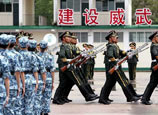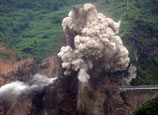
Related Reading:
>> Japan urged to stop being provocative over Diaoyu Islands
>> Japan seeks to 'nationalize' islands
On July 17, the words of Japan's Prime Minister Shinzo Abe once again revealed to the world the coveting of neighboring territory and the threat he poses to regional security and stability.
According to Japanese media, Shinzo Abe distorted the facts of the situation by claiming that "the Diaoyu islands are fundamentally Japanese territory, according to both history and international law". He took an uncompromising position in emphasizing that any concessions on the matter are out of the question.
Diaoyu and its affiliated islands are Chinese territory. Sovereignty over their territorial waters and airspace belongs to China. On the Diaoyu islands issue, the Chinese government and people stand firm in their commitment to territorial sovereignty. The historical truth of the Diaoyu islands conflict is quite clear, and Shinzo Abe’s intemperate words serve no purpose other than to inflame an already delicate situation.
After the Sino-Japanese War of 1894-1895, the Japanese cabinet passed a secret resolution to bring the Diaoyu islands under the jurisdiction of Okinawa Prefecture. On April 17, 1895 China was forced to sign the unequal Treaty of Maguan with Japan, and Taiwan and all its affiliated islands, including the Diaoyu islands, were ceded to Japan. After the Second World War, the Diaoyu islands were returned to China. However, in the 1970s, the United States and Japan came to a confidential and underhand arrangement over the islands which again represented a serious infringement of China's territorial sovereignty.
Matters of territorial integrity are at the core of the post-war international order. According to the provisions and the spirit of The Cairo Declaration and The Potsdam Declaration, sovereignty over Diaoyu and its affiliated islands belongs to China. This is an indisputable fact. There is no substance to the assertion that the Diaoyu islands “are fundamentally Japanese territory, according to international law”. Japan’s position with regard to the Diaoyu islands issue is an evident denial of the victory and the achievements of the world antifascist war, and a serious challenge to the postwar international order. This is already causing alarm in the Asia-Pacific region and beyond.

















 Elder couples celebrate golden wedding anniversary in Hangzhou
Elder couples celebrate golden wedding anniversary in Hangzhou


![]()
